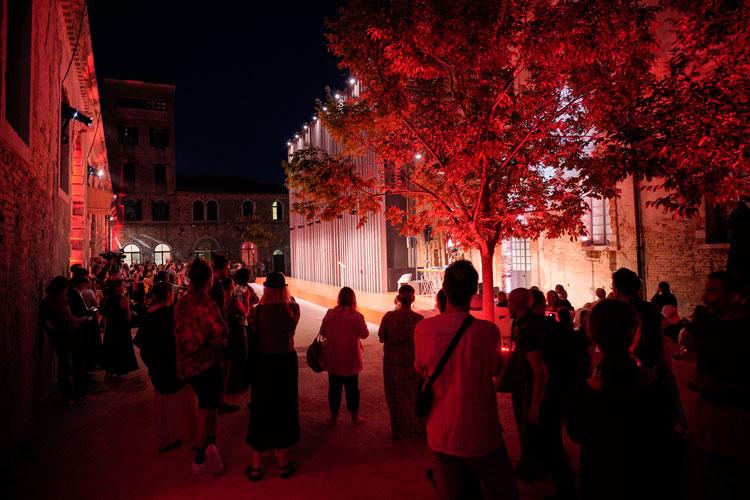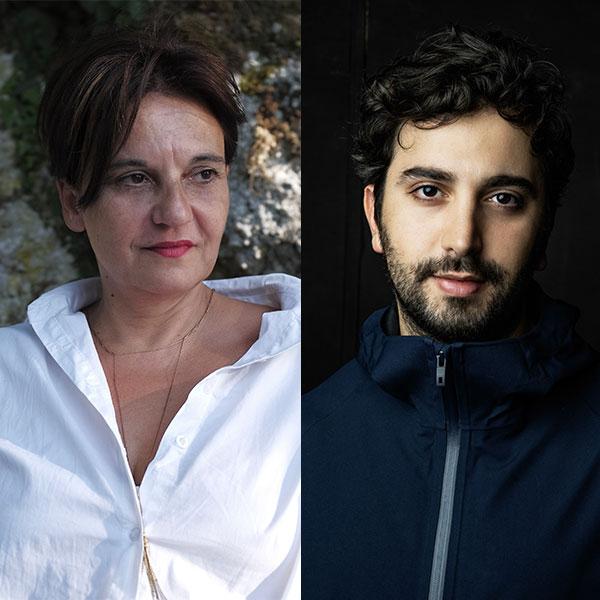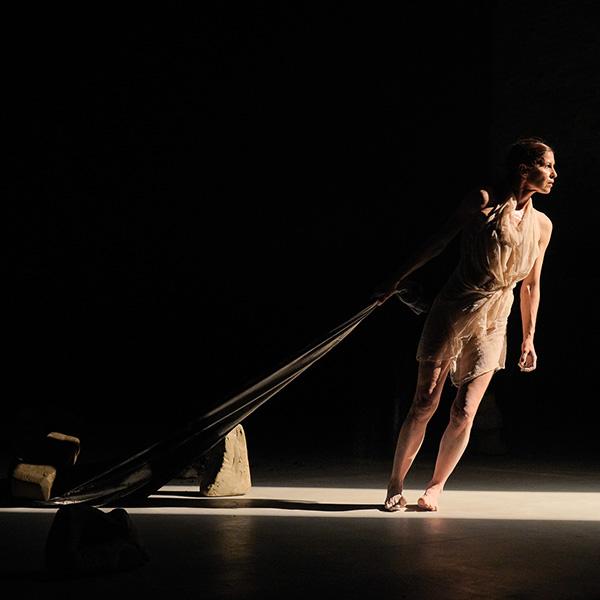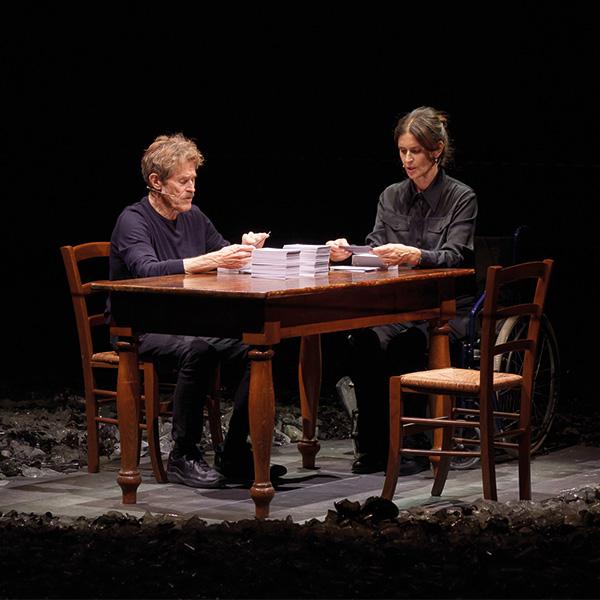
Biennale Teatro 2022: ROT. The blinding red and the raging fury
Titled ROT, because “it has a hard sound: it’s a scratch, a tear that speaks of effort”, the 50th International Theatre Festival runs from 24 June to 3 July 2022.
Biennale Teatro 2022
Rot
It’s time for us to come together again, to sit side by side on those red seats (inhabited once again by passionate hearts, not the inert greyness of cardboard silhouettes). To sit before that red curtain, which is ready to open, for the duration of a performance, on our collective experience – one which may be battered, yes, but still sharp, combative, and alert.
A Festival where thoughts, visions and imaginations collide – which sees us let our guard down and work together to destroy rock-solid certainties and increase our awareness, bearing witness to the dignity and infinite possibilities of Mankind.
A Festival that is a mirror that vibrates with the world and listens to our changing societies, and whose primary missions will be Creation and Transmission.
A Festival that is a factory for gestures and words, where we will put our existences, our excesses, our dreams, and our bodies under the microscope.
A Festival that acts as a defender of human rights, a leader of poetic symphonies, a champion of resistance, a producer of diversity, an inventor of opportunities: and does it simply, free from the rock fragments of theory or the pillars of instruction.
A Festival that resists and is immune to the reign of cynicism, to chronic catastrophism; one that sketches out and validates a better future by turning our gaze in another direction.
"The sky is blue only by convention; it’s actually red".
Alberto Giacometti
This year’s theme
Starting from the title, we felt that the German language would be the most appropriate to express the central theme of this year’s Festival:
ROT has a hard sound: it’s a scratch, a tear that speaks of effort; it’s the sound your teeth make as they struggle.
ROT is a blinding red, the metamorphosis of passion, it’s iconoclasm and raging fury; it’s the blood that irradiates our hearts or the mark left by the violence of crimes perpetrated. It’s moral deafness in the name of a personal god, the trampling of dignity, and a cry of desperation in the face of the barbaric interment – even today – of ideas like peace and freedom.
ROT is the pristine soul, it reflects our château intérieur; it’s the language of forgiveness and the emotions; it’s the ancestral colour of Eros that makes our hearts beat faster, our blood pressure soar, and causes us to breathe more heavily.
ROT doesn’t mean ‘stop’ but conscious action and dogged resistance; it’s the roaring flame of ethical struggle.
ROT rebels against the superficial, the herd, every false idol and opportunism.
ROT is the sick, agonising animal bursting with magnificence in its opposition to all this.
ROT is you, your body – but you’d forgotten.
It’s a body that needs to tear off its own skin to become the auscultatory instrument that listens in on the world – the dowsing rod that explores the organs of this animal, the Earth – to see how far its inhabitants have evolved, or which species have been rendered soundlessly extinct. As Christiane Jatahy’s bodies comb the planet for twinned traces of themselves, those of Caden Manson/Big Art Group pant spasmodically, hoarding to fill the void; Milo Rau’s beaten, solitary limbs contrast with the nostalgia of Deflorian/Tagliarini’s; while Peeping Tom’s altered bodies are assuaged by the dream of Olmo Missaglia’s metamorphosed structures, Samira Elagoz’s reconstruction of identity converses with Belova/Iacobelli’s inorganic humans; and Yana Ross legitimizes the identity of an epidermal layer that stands against the ‘battle of the sexes’, travelling through Antoine Neufmars’ impudently hypertrophic olfactory glands, which find reflective shelter in Aine E. Nakamura’s fragile voice.
Bodies, fragments, and organs displayed in blister packs with no qualms whatsoever. These are medical treatments to sedate the nanny that would have us be the squatters of our own selves, allowing us to become owners of meaning once again.
Furthermore, ROT therapies are actual non-pharmacological treatments: they consist in revitalising an interest in environmental stimuli, encouraging all war veterans and those with Alzheimer’s to engage with others, re-orientating the confused patient in time and in relation to their own history.
For the Biennale Teatro 2022 we will start precisely from this rehabilitative intervention – ROT – and its countless variations. It will follow the thread of the times we live in and illuminate the tremors of a Humanity that needs to invent new forms of life through cultural transfusion.
Bloodstreams, tides of red, expressive estuaries: the Creations hosted at the Festival will cross boundaries to offer us works of ‘interference’ rich in a heterogeneous variety of languages, techniques and codes, in dialogue with the urgent needs of the Present. Not just one, but many, possible kinds of theatre, where meaning flows freely between one ‘grammar’ and another.
Bringing an unprecedented series of partners together, we will lower the granite drawbridges to establish real exchanges between disciplines (such as Dance, Music, Visual Arts, Architecture and Cinema). We will promote emerging talent, giving it a voice, visibility, and the opportunity to experiment and create original work with the help of the Biennale College Teatro Calls for proposals (for Directors Under 35, Authors Under 40 and Performers Under 40). Through the Round Tables and Masterclasses – and assisted by an international team of scholars, industry professionals, journalists, artists, and maîtres at the top of their field – we will provide reactive fluids to navigate the circulatory apparatus of new animal forms, hybridizing linguistic, gestural, visual, acoustic and material archipelagos, injecting oceans of globules and blood platelets into our veins to allow the Theatre of tomorrow to proliferate.
Late Hour Scratching Poetry
The images bouncing off communication platforms are apocalyptic. It’s paradoxical to talk about communication when the signals transmitted belong to deafness, an obstinate shutting off, solipsism.
After the two years of silence dictated by the pandemic – a catastrophe which should, at the very least, have given us a sense of how much we were losing in terms of our relationships with one another – after all that the devastation of the war in Ukraine, the marks left by the bombs, both on History and the faces of people who could just as easily be us, tell a story of barbarity and humanity’s ultimate defeat.
To attempt to talk about Theatre and its moral action appears something of a golden contradiction then, when faced with the stubborn desire to anchor ourselves in our own dehumanization, itself disguised as a comfort zone.
Alda Merini’s voice, her texts of poetic everyday life, and a group of female performers: together, these map out a nocturnal constellation in which words form an evocative pendulum, a means of putting the fragments back together.
With an altogether different breath, this daily coming together at nightfall enables us to listen, to come to terms with the way we see things and put our objective view on hold. Eyes closed, it allows us to let the sparks of Alda Merini's poetry reverberate through our arteries, and restructure our individual experiences; it’s the Doppler ultrasonography that unveils the innocence we had long archived.
LATE HOUR SCRATCHING POETRY is an ambitious project that sees the participation of major institutions and female artists – in addition to the mise en lecture of Alda Merini’s famous prose works, notably La pazza della porta accanto (The Crazy Woman Next Door). Leading the way into these universal words is a heroine of our times, an artist and woman who breaks all the rules of the conventional identity portrait, brushing it off with a rough-edged spirit devoid of any self-satisfaction. Asia Argento will be the first to sponsor this adventure with that same voice, heart and limbs we’ve seen shake and shape-shift in so much international cinema.
This bold project also sees a partnership with one of the oldest and most prestigious drama schools. The Accademia Nazionale d’Arte Drammatica Silvio d’Amico will be the muse that weaves the fabric of this design, starting with the artist heading up the project: Galatea Ranzi. As one of her generation’s foremost representatives in Italian theatre and cinema – as well as a graduate of the prestigious Institute – Galatea will curate this journey of nightly segments, one for each night of the Festival. Every night she will be accompanied by a different female performer, a host of women who represent the theatre of tomorrow, and all graduates of the same academy.
On the final night of the Festival, the journey will be sealed by an appearance from the rarefied figure of Sonia Bergamasco. As one of the most rigorous and vibrant performers to grace the contemporary Italian stage, she will be charged with bringing us ‘back to land’.
“And Philosophy does not dwell in the wise alone, but also, as has been
above proved in another book, wherever the love of her dwells.”
Dante Alighieri, Convivio
This nocturnal feminine city will also play host to the masculine essence of Demetrio Castellucci, amid female performers and authors. Thanks to a sonic sensitivity nurtured in his family environment and enriched by a wealth of professional experiences abroad, he will sketch out a path of musical evocations that will leave the words suspended in time, allowing sound to inhabit the body and vice versa. After floating in amazement, once the last fluorescent poetic phoneme has been uttered they will take a deep dive into a DJ set – a Dantesque banquet that will transform astonishment into a feast, recapturing that sense of being together, and glorifying in our real, everyday life. The outcome will be a blurring of the boundaries of feminine and masculine, towards a multiform word–gender that outlines the desire for peace, freedom and respect for the differences of others – a wealth yet to be secured.


